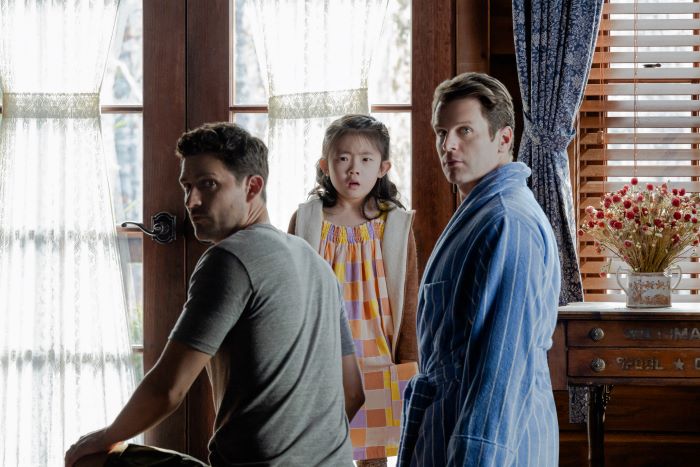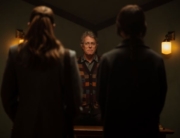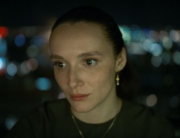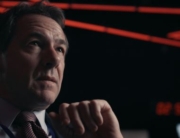Night Shyamalan movies, both good and bad, tend to share the same weird dialogue patterns: Characters reveal motives or make small talk in a blunt, overexplanatory manner, as if they’re still trying to figure out how normal people have conversations. Surprise twists aside, it’s the primary reason why Shyamalan’s films can veer into unintentionally humorous territory, and while Knock at the Cabin leans toward the positive side of his repertoire, that speech pattern is present. We see it as early on, when a hulking yet soft-spoken man named Leonard (Dave Bautista) approaches a girl, Wen (Kristen Cui), and alludes to a cryptic mission he must pull off at her dads’ remote cabin.
Thankfully, this manner of speech only applies to its antagonists, and does little to hinder Shyamalan’s aptitude for generating tension and tragedy in a compact, single location. But what might be the most shocking and refreshing thing about this movie, particularly for this director, is how straightforward it feels.
There’s nothing uniquely special about Wen and her dads Eric (Jonathan Groff) and Andrew (Ben Aldridge). They are kind and loving parents who deeply care for their daughter. Yet all three have been chosen by Leonard and his colleagues Redmond (Rupert Grint), Sabrina (Nikki Amuka-Bird), and Adriane (Abby Quinn), who reluctantly take the family hostage. They are a motley crew of prophets with makeshift weapons, driven to this cabin from different corners of the United States by supernatural visions none can explain. Yet all have foreseen the same premonition: The apocalypse is coming, and to stop it, Eric, Andrew and Wen must select a member of their family to be sacrificed.
It is, to put it nicely, a little bonkers. Indeed, much of Eric and Andrew’s reactions to the foursome’s demands are what most of us would think: disbelief, outrage, but mostly just confusion at what the hell these people want. Initially, the film does so too. Aside from flashback sequences of the gay couple, we almost never see the outside world. So as far as Eric and Andrew can tell, this is just one big hoax. Only, maybe it isn’t?
Yes, Shyamalan’s bizarre way of writing dialogue does occasionally undercut the tension, but not as much as you’d think. As an adaptation of Paul Tremblay’s novel The Cabin at the End of the World, Shyamalan and co-writers Steve Desmond and Michael Sherman stay mostly faithful to the original text (minus its climax) without veering into The Last Airbender–levels of adaptation butchering. And it oddly fits the so-called villains’ motives. These are not criminals or highly skilled mercenaries. They’re a bunch of average Joes who fervently believe in the necessity of this horrendous choice, so the awkwardness of their dialogue benefits the mood. This is especially the case with Bautista, who blends his gigantic physique with a hushed, awkward delivery that makes you feel sorry for Leonard, even as he traumatizes our heroes to no end.
The cinematography is a different story. Despite utilizing frequent Roger Eggers’s collaborator Jarin Blaschke, Knock at the Cabin relies a lot on shot/reverse shots, the occasional Dutch angle, and off-kilter wide shots for an action scene. They certainly set the mood, lending the drama an in-your-face intensity that accommodates the cast’s sternness. Yet you can’t help but wish Shyamalan and Blaschke applied some more creative shots that Eggers’s own The Lighthouse pulled off, a movie with a similar isolated space that has fewer characters.
Its Groff and Aldridge, however, who keep the movie grounded. Watching Eric and Andrew rely on each other to fight back, you believe their love as partners and parents is genuine, even as they diverge on whether Leonard’s group is onto something. For Andrew specifically, there’s a cynical edge refined by years of homophobic judgements and comments from the outside world, one of which ties into the invaders’ origins. It adds an extra layer to why he’s so adamant on rejecting the strangers’ demands, not just because of their claims’ absurdity, but enmity to saving a world that’s done little to treat him and his husband with respect.
Again, the strangest twist about Knock at the Cabin is how there is none. Shyamalan doesn’t pull a major revelation out of left field, and what twist we get feels in line with the movie’s early biblical overtones. For a director so consumed with catching his viewers off guard, often to his reputation’s detriment, Knock at the Cabin simply doesn’t require that to hook your interest. It just tells a story that, however unnerving, is deeply affective. You just need to wade through a lot of weird dialogue to enjoy it.







Leave A Comment